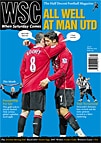 Brazil face local opposition to their bid to host the 2014 World Cup. Robert Shaw reports
Brazil face local opposition to their bid to host the 2014 World Cup. Robert Shaw reports
Will Brazil host a second World Cup in 2014, 64 years after first doing so and 36 years after the last tournament in South America, Argentina 78? What seemed a formality now looks less certain, not just because Colombia – the intended hosts of the 1986 tournament before they withdrew for financial and security reasons – have made a bid to win the final FIFA vote, due to take place in November.
Until December 18 – when the Colombian FA broke ranks – it seemed that traditional rivalries had given way to South American solidarity. Talk of a joint effort from the Andean countries or one of Chile, Argentina or Uruguay presenting rival bids came to nothing in the face of sustained lobbying from the Brazilian Confederation (CBF).
“South America shouldn’t present just one candidate. The ideal is that two or three countries fight for the possibility of hosting the cup,” explained Luis Bedoya, the Colombian FA’s president. Still, CBF president Ricardo Teixeira persuaded officials from Conmebol, the South American Confederation, to confirm that they only considered one of the bids practical. And Colombian journalist Francisco Henao believes that since the local stadiums are “obsolete”, there is little realistic chance of his country getting the nod.
In terms of inadequate stadiums, though, much the same could be said about Brazil. Plenty of grounds hold upwards of 40,000, but only the Kyocera Arena in provincial Curitiba currently resembles the type of place that would be approved of by corporate visitors. Rio’s Maracanã remains one of the most potent symbols of a Brazilian bid. But while many would argue that the Estádio Mario Filho (its official name) is the only place that could stage the 2014 World Cup final, Teixeira believes it should be demolished to make way for a stadium with a bigger car park and more corporate facilities.
British architect Barry Lowe, who helped design the new Wembley, agrees. He argued at December’s International Sports Sponsorship Forum in Rio de Janeiro that “a great stadium of its time needs to be replaced by a better stadium that will matching the reputation the previous venue had”.
Concerns about preparedness are also echoed by former national-team coach Carlos Alberto Parreira. “The fact that Brazil has announced its candidature does not mean it will be approved,” he said. “FIFA will be even more demanding after the World Cup in Germany, which was probably the best ever in terms of infrastructure and logistics.” He acknowledged that Brazil has much to do in terms of security, transportation and accommodation. “The government also has to become fully involved. The CBF can’t create changes in these areas on its own.”
Brazil’s experience of holding major sports events is limited. Rio de Janeiro will host the Pan-American Games in 2007, but the delays in construction of facilities have plagued the organisers.
Ticket pricing and attendances at lower-profile games are sure to be issues, as they will be in South Africa. Brazil’s domestic league has the lowest average crowds of any of the principal footballing nations. If sold at equivalent levels to those for Germany 2006, tickets would simply price out most Brazilian fans. Accustomed to paying an average of R$10 (about £2.50) to watch league games, and often attracted by promotions offering entry for less than £1, spectators are unlikely to stump up more than a third of the monthly minimum wage to see unfamiliar teams.
Infrastructure is also a major concern. With no national rail network and roads of variable quality, the only practical option in Brazil is air travel. But a recent crisis in the country’s airports left domestic and international passengers grounded, prompting Marcelo Damato of sports daily Lance! to ask: “Can anyone imagine 10,000 English, Italians or French at any Brazilian airport trying to embark because their team is playing in another Brazilian city in three days? Simply there would be no way of transporting them, even without the air crisis.”
If the Brazilian bid is rejected, expect a replacement to come from further north. The United States has more than enough car parks and corporate hospitality boxes to satisfy FIFA…
From WSC 24o February 2007. What was happening this month